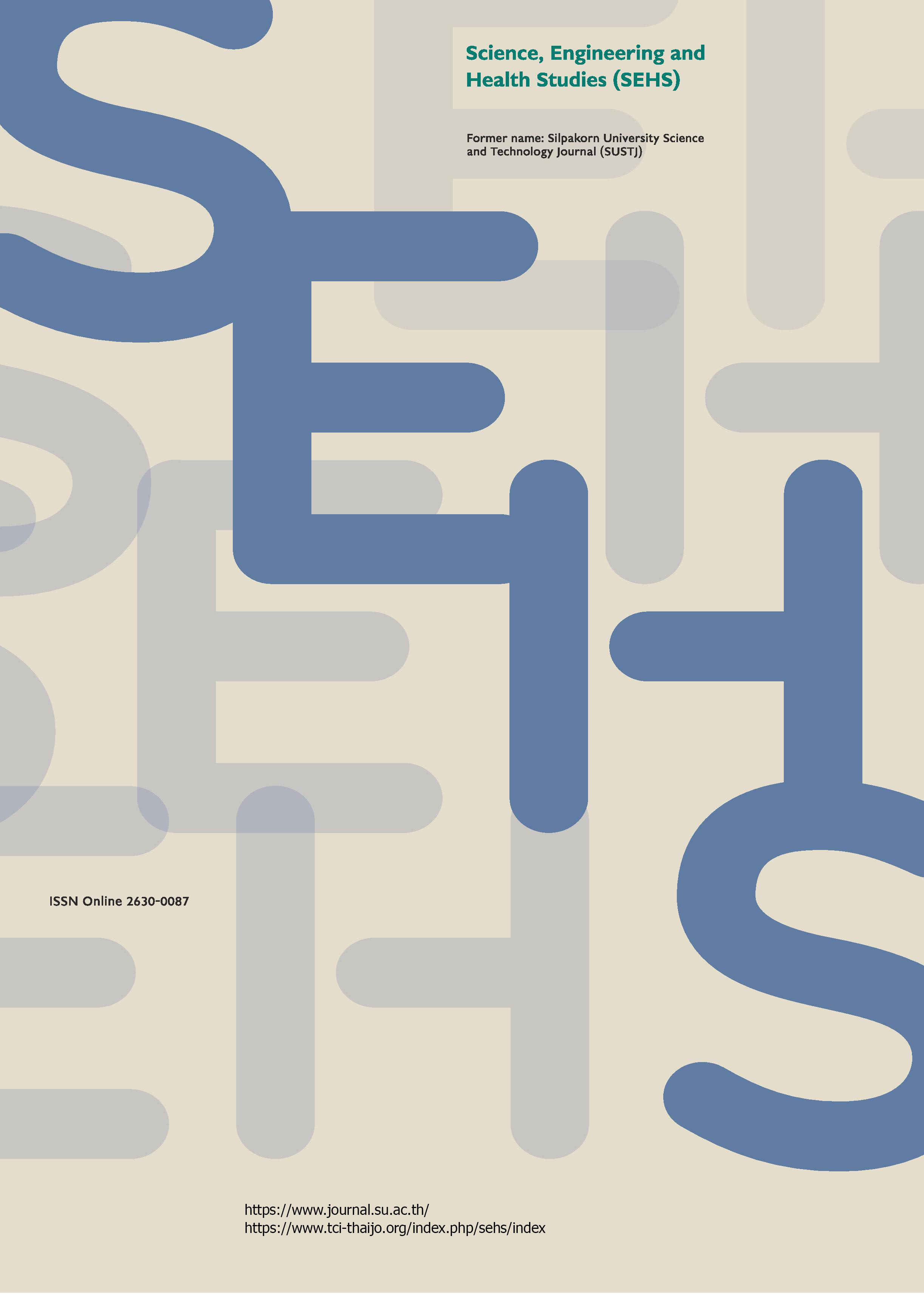Doxorubicin-loaded N-naphthyl-N,O-succinyl chitosan micelles for colon cancer treatment
Main Article Content
Abstract
Doxorubicin (Dox) is one of the effective treatments in many types of cancer, such as breast cancer and ovarian cancer. However, the clinical settings of this drug are limited by its low therapeutic efficiency and high toxicity to normal cells. To achieve better anticancer efficacy, Dox-loaded micelles were developed using the amphiphilic chitosan derivative N-naphthyl-N,O-succinyl chitosan (NSCS) through the dropping technique. The physicochemical properties including particle size, zeta potential, morphology, encapsulation efficiency (%EE), and loading capacity (LC) were evaluated. Results revealed that the Dox-loaded micelles were spherical in shape with a nanosized diameter (<200 nm) and negative charge (-30 mV). Incorporation of Dox into the micelles at the initial drug concentration of 40% w/w to the polymer provided the highest values of %EE (76.42%) and LC (305.68 μg/mg), reflecting that a high amount of drug could be encapsulated into the inner core of the micelles. Moreover, the Dox-loaded micelles exhibited higher cellular uptake compared with the free drug. In vitro cytotoxicity against HT29 colorectal cancer cells revealed that the Dox-loaded micelles had a greater inhibitory effect than the free drug with lower IC50 values. Therefore, these NSCS micelles may be potential nanocarriers to deliver Dox for colon cancer treatment.
Downloads
Article Details
References
American Cancer Society. (2017). Colorectal cancer facts & figures 2017-2019. Atlanta: American Cancer Society, pp. 1-40.
American Cancer Society. (2018). About colorectal cancer. [Online URL: www.cancer.org/cancer/colon-rectal-cancer/about.html] accessed on June 1, 2020.
Attia, M. F., Anton, N., Wallyn, J., Omran, Z., and Vandamme, T. F. (2019). An overview of active and passive targeting strategies to improve the nanocarriers efficiency to tumour sites. Journal of Pharmacy and Pharmacology, 71(8), 1185-1198.
Biswas, S., Kumari, P., Lakhani, P. M., and Ghosh, B. (2016). Recent advances in polymeric micelles for anti-cancer drug delivery. European Journal of Pharmaceutical Sciences, 83, 184-202.
Cisterna, B. A., Kamaly, N., Choi, W. I., Tavakkoli, A., Farokhzad, O. C., and Vilos, C. (2016). Targeted nanoparticles for colorectal cancer. Nanomedicine (London, England), 11(18), 2443-2456.
Deshmukh, A. S., Chauhan, P. N., Noolvi, M. N., Chaturvedi, K., Ganguly, K., Shukla, S. S., Nadagouda, M. N., and Aminabhavi, T. M. (2017). Polymeric micelles: Basic research to clinical practice. International Journal of Pharmaceutics, 532(1), 249-268.
Fan, D., Yu, J., Yan, R., Xu, X., Wang, Y., Xie, X., Liu, C., Liu, Y., and Huang, H. (2018). Preparation and evaluation of doxorubicin-loaded micelles based on glycyrrhetinic acid modified gelatin conjugates for targeting hepatocellular carcinoma. Journal of Nanomaterials, 2018, 8467169.
Gao, X., Wang, B., Wei, X., Rao, W., Ai, F., Zhao, F., Men, K., Yang, B., Liu, X., Huang, M., Gou, M., Qian, Z., Huang, N., and Wei, Y. (2013). Preparation, characterization and application of star-shaped PCL/PEG micells for the delivery of doxorubicin in the treatment of colon cancer. International Journal of Nanomedicine, 8, 971-982.
Gothwal, A., Khan, I., and Gupta, U. (2016). Polymeric micelles: recent advancements in the delivery of anticancer drugs. Pharmaceutical Research, 33(1), 18-39.
Hossen, S., Khalid Hossain, M., Basher, M. K., Mia, M. N. H., Rahman, M. T., and Jalal Uddin, M. (2019). Smart nanocarrier-based drug delivery systems for cancer therapy and toxicity studies: A review. Journal of Advanced Research, 15, 1-18.
Hu, T., Li, Z., Gao, C. Y., and Cho, C. H. (2016). Mechanisms of drug resistance in colon cancer and its therapeutic strategies. World Journal of Gastroenterology, 22(30), 6876-6889.
Kansom, T., Sajomsang, W., Saeeng, R., Charoensuksai, P., Opanasopit, P., and Tonglairoum, P. (2018). Apoptosis induction and antimigratory activity of andrographolide analog (3A.1)-incorporated self-assembled nanoparticles in cancer cells. AAPS PharmSciTech, 19(7), 3123-3133.
Sonowal, H., Pal, P. B., Wen, J. J., Awasthi, S., Ramana, K. V., and Srivastava, S. K. (2017). Aldose reductase inhibitor increases doxorubicin-sensitivity of colon cancer cells and decreases cardiotoxicity. Scientific Reports, 7(1), 3182.
Soodvilai, S., Tipparos, W., Rangsimawong, W., Patrojanasophon, P., Soodvilai, S., Sajomsang, W., and Opanasopit, P. (2019). Effects of silymarin-loaded amphiphilic chitosan polymeric micelles on the renal toxicity and anticancer activity of cisplatin. Pharmaceutical Development and Technology, 24(8), 927-934.
Woraphatphadung, T., Sajomsang, W., Gonil, P., Saesoo, S., and Opanasopit, P. (2015). Synthesis and characterization of pH-responsive N-naphthyl-N,O-succinyl chitosan micelles for oral meloxicam delivery. Carbohydrate Polymers, 121, 99-106.


